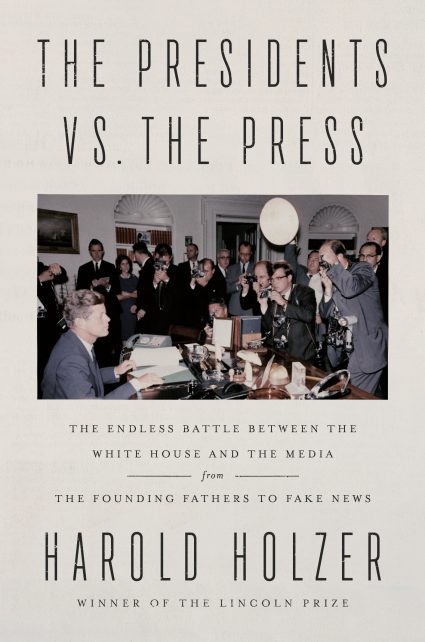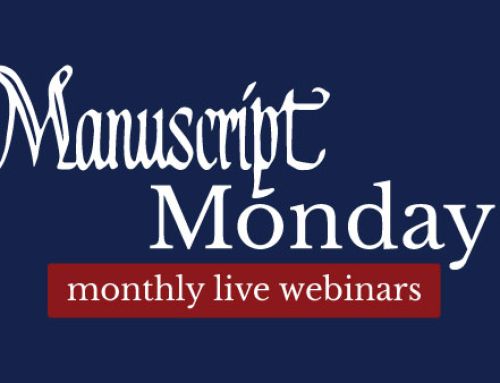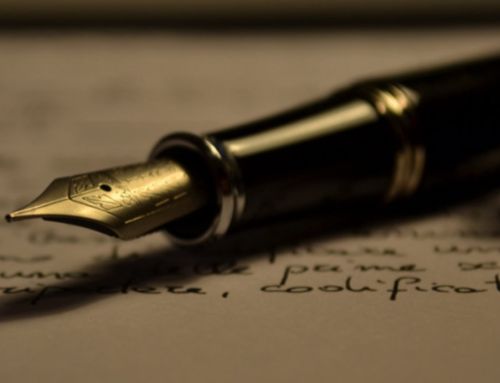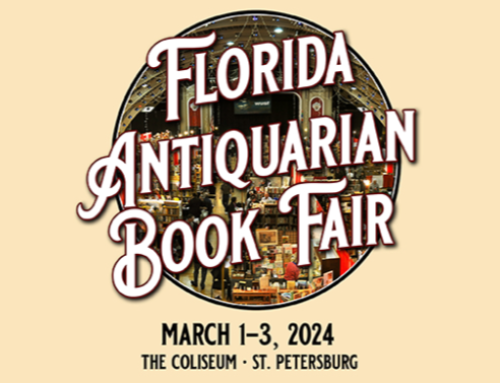AN INTERVIEW WITH HAROLD HOLZER

Harold Holzer @ Matt Capowski
In 1996 Harold Holzer received the Manuscript Society Book Award for his Dear Mr. Lincoln: Letters to the President. Our award is only one among many bestowed on Mr. Holzer, which include the 2015 Gilder-Lehman Lincoln Prize and in 2008, the National Humanities Medal. No doubt Manuscript Society members will be familiar with some of the many other books he has authored or co-authored on Lincoln and the Civil War era such as Lincoln at Cooper Union and The Civil War in 50 Objects. Now Holzer, who serves as the Jonathon F. Fanton Director of the Roosevelt House Public Policy Institute at Hunter College, has authored a new book entitled, The Presidents vs. The Press. It is garnering avid reviews, including one from presidential historian Michael Beschloss, who deems it “a sweeping, groundbreaking, and important history.” Therefore, we were thrilled when Mr. Holzer consented to devote part of his 2020 Labor Day weekend to respond to interview questions posed by past president Al Ottens. We think you’ll enjoy his candid comments.
Al Ottens (AO): Mr. Holzer, would you give us an encapsulated description of your book—what the reader will encounter?
Harold Holzer (HH): I think readers will find that when it comes to the battle between the presidents and the press, what’s old is new again: that is, Donald Trump’s tirades are unprecedented only because they are amplified so often on the Internet. In truth, ever since the Jeffersonian press began subjecting George Washington to brutal political and personal attacks beginning in the third year of his first term, the “media” and the chief executives have had an adversarial relationship. John F. Kennedy fully understood this: we’re not meant to be pals, he cautioned his staff (even as he maintained close and beneficial friendships with journalists). What’s more, several presidents, including Adams, Lincoln, Wilson, FDR, and Nixon have all cracked down harder on the press than Trump has—compared to them (not to give him ideas), Trump is all bark and no bite. I think readers will discover too that, at least as I see it, the presidents who have succeeded best as communicators are those who have made themselves available, and dealt both professionally and congenially with the press while concurrently developing alternative means to go around the press corps and speak directly to the public through new technologies. Those are the points that constitute, as journalists might put it, the “takeaways.”
AO: What drew you to this topic or motivated you to write this comprehensive and heavily researched book?
HH: Well, I had very much enjoyed researching and writing my 2014 book Lincoln and the Power of the Press and it was hearteningly well-received. So I decided that a combination prequel and sequel was in order, at first just to see if Abraham Lincoln’s own crackdowns against the press were historically unique. The more I thought about expanding my inquiry, I realized I had some valuable experience beyond my willingness to do research that I might apply to such a project. I once worked (albeit briefly, as a very young man) for a newspaper, and later spent part of my career as a political press secretary, for Bella Abzug, in Congress and in her campaigns for U. S. Senate and Mayor of New York City; and for Mario Cuomo, in his own race for mayor and in his gubernatorial administration. I thought I could bring the right combination of professional experience and research background to explore this subject from many angles. Plus I’ve spent the last five years of my career as Director of the Roosevelt House Public Policy Institute at Hunter College in New York, where I’ve been happily immersed in all things FDR. Roosevelt House is actually the Manhattan town home in which FDR, Eleanor, and his mother lived for the 25 years before he left for Washington to assume the presidency. It was here that Roosevelt gave what amounted to his first fireside chat—I work two floors above that fireplace! It was here that reporters massed during the 1932-33 transition waiting for briefings from the president-elect, yet agreeing among themselves not to photograph him struggling on his leg braces, using a wheelchair, or being lifted in and out of automobiles. That was a complicated relationship I definitely wanted to explore. It was working in FDR’s home that really inspired me to reach beyond my lifelong focus on Lincoln.
AO: What overall conclusions did you draw about presidents and the press from all your research and sources?
HH: My research suggested that tension between presidents and the press is the norm, not the exception, and that open hostility breaks out occasionally, almost inevitably: everything from interference with the post office (Jackson), labeling disobliging reporting as “fake news” (TR), and finding new, high-tech means of going around the press (FDR with radio and Donald Trump with Twitter). I learned that presidents other than Donald Trump have castigated the press, and that some have cracked down harshly: Adams by enforcing the Sedition Act; Jackson by appointing a friendly journalist as Postmaster General (who in turn contemplated banning the flow of anti-Jackson newspapers through the Post Office); and Lincoln by authorizing the shutdown of more than 200 Democratic newspapers during the Civil War and imprisoning opposition editors without trial. Wilson and FDR censored news during the world wars while creating formidable propaganda machines to maintain public support for the fighting, and for all his much-touted transparency, Barack Obama limited access by the press and wiretapped reporters who printed leaked information—citing the same 1917 espionage laws that Wilson had used. I came away from the project reminded powerfully that it remains crucial to have an independent press covering the president. As Jefferson put it (even though he enjoyed making life difficult for opposition editors, too), the free press was the “tocsin of the nation”—it’s most crucial alarm bell against threats to liberty. Accordingly, journalists have ever been alert to attempts to chill coverage—from the crusaders who covered Richard Nixon to the terribly maligned, so-called “enemies of the people” who try so hard to hold Trump to account.
AO: In Letters to Lincoln you relied on ink-on-paper sources. The Presidents vs. The Press required relying mostly on sources such as interviews, newspaper accounts, audio and video recordings, Tweets, and emails. Did you have any feelings or preferences for working with the traditional document sources or an assortment of information and media sources?
HH: I must say that I prefer examining manuscripts and newsprint to poring over audio and video tapes, twitter records, and interviews. It may be that I’m just more comfortable with the past than the present—and maybe I just like the tactile process of doing in-person archival research. I certainly miss the libraries and archives that have been closed for so many months during the pandemic. But I did very much enjoy talking to some of the people who have experienced this eternal struggle, including President Clinton and newsman Jim Lehrer, in what might have been his last interview about covering the White House in general. It was really the first time in 50 years that I’ve interviewed people for publication—since my days writing for the long-gone Manhattan Tribune. Of course, archives can be consulted on many different platforms these days. I also found a wealth of material, for example, in the typescripts of the news conferences held by Woodrow Wilson and Franklin Roosevelt in the era before such events were recorded. Those were just fascinating. I read all 998 from FDR.
AO: You discussed Washington’s draft of his Farewell Address which contained a bitter diatribe against the “Gazettes of the United States” for printing their “malicious falsehoods” against him. This paragraph did not survive the subsequent revision of the address done by Hamilton. Somehow this important handwritten insight into GW’s feelings survived. Much to the delight of manuscript collectors and historians. Did you personally examine this draft of the Farewell Address? Were there any other relatively obscure yet revelatory handwritten notes, diaries, speeches, letters, etc. that you came across in your research?
HH: I must confess I did not see the actual handwritten draft of Washington’s address—the one containing his grievance against the press. As comfortable as I am with original materials from the Lincoln era, I would be almost afraid to ask to touch Washington’s Farewell Address—not that I actually believe I would be allowed to handle it. In fact, this question reminds me that I want to address a serious concern I’ve been seething about for a couple of years now. It’s getting increasingly difficult to call for original manuscripts—from anyone, much less Washington—at public repositories. If the material exists on microfilm, scholars are discouraged—forbidden, really—from examining the originals. I found this to be the case when I tried using the Daniel Chester French Papers at the Library of Congress. Here I was, working on my 53rd book, a veteran who’d long enjoyed almost unlimited access to original sources at the LOC. But now I was compelled to use microfilm: very upsetting and very discouraging, not just for me, but for scholars everywhere, now and especially in the future. Microfilm is no substitute for the original stuff; I can’t begin to tell you how many unexpected things I’ve found in the original Lincoln papers by turning a page, or looking at an attachment—a handbill, a newspaper clipping—that had never been photographed for microfilm. As for your question about notes and diaries, I very much liked using John Quincy Adams’ diary for the first time, and of course the Jefferson and Washington papers online. FDR’s one and only press secretary, Stephen Early, left his papers to the FDR presidential Library at Hyde Park, and it proved another treasure trove. I don’t think too many researchers beyond Early’s biographer have used that material. I did consult one unpublished, handwritten private note from one past president—I won’t identify him here; it’s in the book—and I quoted from it because it beautifully illustrated a point about battles between presidents and the press. This book also required me to use published memoirs—many of them pretty obscure—by several generations of White House newsmen. These proved great fun and yielded wonderful quotes, I must say. But you made a telling point earlier: much research for this book was spent in front of my computer, watching the press conferences of Lyndon Johnson, Richard Nixon, Jimmy Carter, and on and on…and on.
AO: The role editorial cartoonists play in politics is hardly touched upon in your book. Yet some like Herb Block of the Washington Post tormented Richard Nixon. Any explanation for their omission?
HH: I think you may have missed my comments throughout the book on editorial cartoons. For example, I talked about the many lampoons of Teddy Roosevelt—the artists loved him because his face and posture were so easy to caricature. I wrote about David Levine’s brilliant riff on Lyndon Johnson’s uninhibited display of his appendix scar: Levine converted it into a map of Vietnam. And I acknowledged the damage done by cartoonists after Jimmy Carter claimed he had beaten off a killer rabbit on a Georgia lake. The killer rabbit cartoon everyone remembers was a takeoff on the movie poster for Jaws—showing a bunny swimming menacingly to the surface, above the caption: Paws. Aside from these and a few more (for example, Wilson caricatured as a professor) The book focused intentionally on the role political editors and White House correspondents played in this relationship—so I will argue that the balance was right.
AO: “Dirty tricksters” have been used during presidential campaigns to get the media to print dirt on opponents. For example, Lee Atwater, an aggressive and highly creative campaign manager, tried to get the media to plant stories about Michael Dukakis having been treated for mental illness. What is your take on the role some have played in the president/press relationship?
HH: I tried to focus on what the presidents did in office—not while campaigning—but some dirty tricks were irresistible, including one astonishing episode in which the Nixon re-election committee contemplated putting LSD on the steering wheel of columnist Jack Anderson’s car to impel a delirium-stoked traffic accident, perhaps even death. But staying with Nixon, a good deal of his chapter is focused on the 1972 campaign—itself a big dirty trick, meaning Watergate. Subsequently, the Reagan team may have pilfered Jimmy Carter’s briefing book before their first TV debate. So, yes, dirty tricks are part of the equation, but the focus remains fixed on how the press covered the presidents, and how the presidents dealt with the press. Else I fear the book may have been 1,000 pages instead of “just” 500!
AO: The clash between the Federalist and Republican presses seemed akin to what we see now between Fox News and MSNBC. You quoted JFK saying about the press, “Always remember that their interests and ours ultimately conflict.” It appears that nowadays only a portion of the media conflicts with a sitting president. Any thoughts about how this might continue to play out in the future?
HH: I definitely think that we’ve entered an era quite similar to the one that encouraged uninhibited partisan coverage in the late 18th and early 19th centuries, a press culture of praise-for-reward that continued into the Jacksonian and Civil War eras and beyond. In those days, newspapers were cogs in political machines; editors ran for office and office-holders ran newspapers. When new presidents came into office, they chose official “organs” to reap the rewards of success, providing them with jobs, access, and lucrative government printing contracts. Like newspaper readers of an earlier period, today’s news consumers seem to view only media that conform to their views and now, as in the past, they are hearing only what they are already disposed to believe. The one big difference between now and then is that in the past, partisan newspapers openly, proudly declared their association with political parties and leaders. Today, both Fox and MSNBC insist that they are covering the news straightforwardly. Of course, they’re doing nothing of the kind. There’s nothing wrong with partisan coverage, per se, but for goodness’ sake, make the obvious clear! As for the trolls and bots and extremists lurking on the web, their presence and their influence really frighten me, as a historian and a citizen—but that’s another story. I’m just glad that I don’t have to do research into conspiracy-theory websites. That’s where I draw the line. I’ll never go there.
AO: With the U.S. on pace to become a “majority minority” nation, are non-white media sources being underestimated for their role in politics?
HH: Non-white media have always been underestimated—that is, by most white people. Lincoln was smarter: when he tired of the editorial criticism in Douglass Monthly, he offered its editor, Frederick Douglass, a military appointment to encourage black recruitment. Douglass never got the commission, but he did that valuable work, and in the bargain suspended publication of his famous newspaper. In the FDR era, press secretary Steve Early—descendant of a Confederate general—barred black journalists from presidential press conferences for 11 years! His excuse: there was room in the president’s small, crowded office only for reporters from daily papers, not weeklies—knowing full well that the black press of the day was largely composed of weeklies. Meanwhile, the administration worked hard to get the black press (and the black readers who voted) to abandon their longtime fealty to the Republican Party, the party of Lincoln, and join the Democrats. And ultimately it succeeded. Most of today’s leaders do seem to understand that the media is bigger than the big dailies or even the big cable networks. Bill Clinton adroitly courted the black press. The Spanish-language media, meanwhile, is another growing force to be reckoned with. Ethnic papers have always been powerful–they almost sank Wilson because of his early anti-immigrant statements. And criticism in the black press has certainly injured Wilson’s reputation for emphasizing racism, which included avoiding the black press and, on one infamous occasion, behaving rudely to an African American reporter who somehow managed to gain access.
AO: Any speculation about where we are headed given the threats to the information we receive from the rise of doctored videos, misuses of Facebook and other social media platforms, cyber-attacks, and ultra-aggressive independent “news” sources such as InfoWars?
HH: If I were a betting man, I’d wager that we’re going to witness a degree of oversight and regulation that we haven’t seen in generations, at least where the Internet is concerned—that is, Facebook and Twitter, which have both been transmitting worthless and dangerous junk in the name of unfettered freedom of expression, and of course, huge profit. I don’t think we’re headed for another sedition law, which John Adams enforced, under which journalists could be prosecuted merely for ridiculing the president. But I do think the big online platforms will have to find a way to separate free speech from hate speech, political argumentation from outright lying, and the free flow of information from foreign interference. I can only hope the tech giants find a way to police themselves, which I think we’re already beginning to see.
AO: Is there a sequel to your book which might focus on how the press treated losing presidential candidates such as Al Smith, Barry Goldwater, or James G. Blaine, for example? That might make very interesting reading.
HH:I hope that suggestion is meant as a compliment—meaning there might be an appetite for more research and writing on this topic. But not from me (famous last words). Honestly: I didn’t even cover all 44 presidents this time. I didn’t think people really wanted to read about John Tyler, Millard Fillmore, and Warren Harding (although their press experiences do interest me). But, honestly: James G. Blaine? Besides, I’m already committed to another project for my new publisher, E. P. Dutton: a book on Lincoln and immigration. I think there’s a good deal of history there that needs to be told, and with it, inspiration and guidance for the future. And yes, the manuscript sources are rich and irresistible. I’ve already dug deeply into the papers of Carl Schurz—those written in English, that is. I’m gratified that the publisher has offered a budget for translation services—so this will be another new challenge and opportunity.





Leave A Comment